#martyrdom of polycarp
Text
Polycarp
Polycarp was born in 69 AD and died in 156 AD. The tale of his martyrdom was chronicalled by eyewitnesses around 160 AD.
He was a member of the early church. He was a part of the second generation of believers. John the Apostle discipled him and he was appointed as bishop of Smyrna (in modern Izmir, Turkey) by some of the original apostles.
When he died at age 86, Polycarp was one of the last…

View On WordPress
2 notes
·
View notes
Text
Revelation 2: Smyrna, Going Deeper
Some have wondered if the ἄγγελος | angelos (which means messenger) of Smyrna might have been the Apostle John’s disciple Polycarp.
#Polycarp #Diocletian #Galerius #ChristianPersecution #Martyrdom
Satan and the Devil
Jesus’s letter to the believers in Smyrna is one of only two that held no correction about the practice of their faith, or spiritual health. There was nothing for them to repent of.
Jesus knew what they were going through, and it was awful. Crushing oppression, poverty, and soon the horrors of first-century prison. They were pressed in on every side, and particularly reviled…
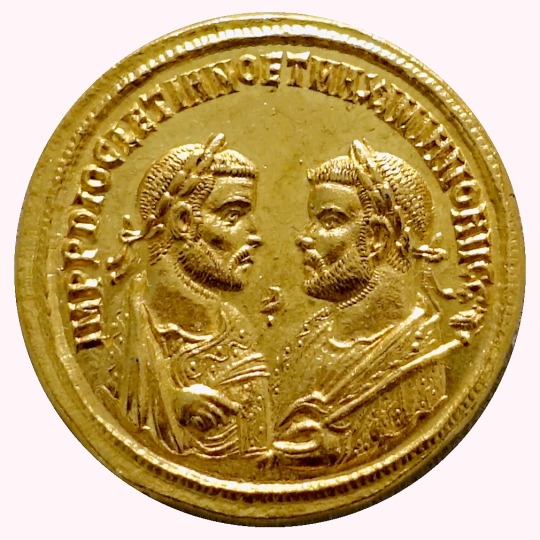
View On WordPress
#crown of life#diocletian#galerius#martyr#martyrdom#Polycarp#revelation 2:8-11#smyrna#ten days#ten emperors#ten years
0 notes
Text
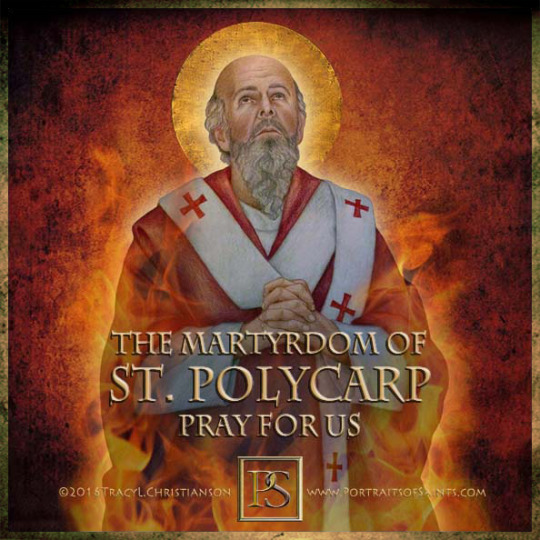
Saint Polycarp
60-156
Feast day: February 23 (New), January 26 (Trad)
Patronage: earaches, dysentery
Saint Polycarp was a disciple of St. John the Apostle and considered one of the three Chief Apostolic Fathers of the Church. As Bishop of Smyrna (Turkey), he protected the Catholic Church against the influences of heresies that Jesus was fully human and He was incarnate. His miraculous martyrdom was recorded by Irenaeus. The Romans tried to burn him alive but the flames arched around his glowing body instead, then they stabbed him, in which his blood put out the fire. Before he died of the stab wounds he said, ”I bless you Father for judging me worthy of this hour, so that in the company of the martyrs I may share the cup of Christ."
Prints, plaques & holy cards available for purchase here: (website)
43 notes
·
View notes
Text
SAINT OF THE DAY (February 23)

On February 23, the Catholic Church remembers the life and martyrdom of St. Polycarp, a disciple of the apostle and evangelist St. John.
Polycarp is celebrated on the same date by Eastern Orthodox Christians, who also honor him as a Saint.
Polycarp is known to later generations primarily through the account of his martyrdom, rather than by a formal biography.
However, it can be determined from that account that he was born around the year 69 AD.
From the testimony he gave to his persecutors – stating he had served Christ for 86 years – it is clear that he was either raised as a Christian, or became one in his youth.
Growing up among the Greek-speaking Christians of the Roman Empire, Polycarp received the teachings and recollections of individuals who had seen and known Jesus during his earthly life.
This important connection – between Jesus' first disciples and apostles and their respective students – served to protect the Catholic Church against the influence of heresy during its earliest days, particularly against early attempts to deny Jesus' bodily incarnation and full humanity.
Polycarp's most significant teacher, with whom he studied personally, was St. John – whose contributions to the Bible included not only the clearest indication of Jesus' eternal divinity but also the strongest assertions of the human nature he assumed on behalf of mankind.
By contrast, certain tendencies had already emerged among the first Christians – to deny the reality of Jesus' literal suffering, death and resurrection, regarding them as mere "symbols" of highly abstract ideas.
With John's help, Polycarp may have been the one who compiled, edited, and published the New Testament
Another Catholic teacher of the second century, St. Irenaeus, wrote that "Polycarp was not only instructed by apostles and conversed with many who had seen Christ; but he was also, by apostles, appointed bishop of the Church in Smyrna."
In a surviving letter that he wrote to the Philippians, he reminded that Church – which had also received the teaching of St. Paul – not to surrender their faith to the "gnostic" teachers claiming to teach a more intellectually refined gospel.
"For every one who shall not confess that Jesus Christ is come in the flesh, is antichrist," he wrote – citing St. John himself – "and whosoever shall not confess the testimony of the Cross is of the devil; and whosoever shall pervert the oracles of the Lord to his own lusts and say that there is neither resurrection nor judgment, that man is the firstborn of Satan."
"Let us therefore, without ceasing, hold fast by our hope and by the pledge of our righteousness," Polycarp taught – as he went on to explain that both hope and righteousness depended upon "Jesus Christ, who took up our sins in His own body upon the cross."
With eloquence and clarity, he reminded the Philippian Church that Christ, "for our sakes, endured all things – so that we might live in him."
However, Polycarp's most eloquent testimony to his faith in Jesus came not through his words but through his martyrdom, described in another early Christian work.
The Church of Smyrna, in present-day Turkey, compiled their recollections of their bishop's death at the hands of public authorities in a letter to another local church.
"We have written to you, brethren, as to what relates to the martyrs, and especially to the blessed Polycarp" – who, in the words of the Catholics of Smyrna, "put an end to the persecution – having, as it were, set a seal upon it by his martyrdom."
Around the year 155, Polycarp became aware that government authorities were on the lookout for him, seeking to stamp out the Catholic Church's claim of obeying a higher authority than the Emperor.
He retreated to a country house and occupied himself with constant prayer, before receiving a vision of his death that prompted him to inform his friends: "I must be burned alive."
He changed locations but was betrayed by a young man who knew his whereabouts and confessed under torture.
He was captured on a Saturday evening by two public officials, who urged him to submit to the state demands.
"What harm is there," one asked, "in saying, 'Caesar is Lord,' and in sacrificing to him, with the other ceremonies observed on such occasions, so as to make sure of safety?"
"I shall not do as you advise me," he answered.
Outraged by his response, the officials had him violently thrown from their chariot and taken to an arena for execution.
Entering the stadium, the bishop – along with some of his companions, who survived to tell of it – heard a heavenly voice, saying:
"Be strong, and show yourself a man, O Polycarp!"
Before the crowd, the Roman proconsul demanded again that he worship the emperor.
"Hear me declare with boldness, I am a Christian," the bishop said. "And if you wish to learn what the doctrines of Christianity are, appoint me a day, and you shall hear them."
"You threaten me with fire," he continued "which burns for an hour, and after a little is extinguished. But you are ignorant of the fire of the coming judgment and of eternal punishment, reserved for the ungodly."
"But," he challenged the proconsul, "what are you waiting for? Bring forth what you will."
Although the crowds clamored for Polycarp to be devoured by beasts, it was decided he should be burned alive, just as he had prophesied.
He prayed aloud to God:
"May I be accepted this day before you as an acceptable sacrifice — just as you, the ever-truthful God, have foreordained, revealed beforehand to me, and now have fulfilled."
What happened next struck Polycarp's companions with amazement. They recorded the sight in the letter that they circulated after Polycarp's death.
"As the flame blazed forth in great fury," they wrote, "we to whom it was given to witness it, beheld a great miracle."
The fire did not seem to touch the bishop's body. Rather, as they described:
"Shaping itself into the form of an arch, it encompassed – as by a circle – the body of the martyr. And he appeared within not like flesh which is burnt, but as bread that is baked, or as gold and silver glowing in a furnace."
"Moreover, we perceived such a sweet odour coming from the flames – as if frankincense or some such precious spices had been burning there."
The executioners perceived that Polycarp's death was not going as planned. Losing patience, they ordered him to be stabbed to death.
From the resulting wound, "there came forth a dove and a great quantity of blood so that the fire was extinguished."
The crowd, as the Christian witnesses recalled, were understandably amazed.
"All the people marveled," they wrote, "that there should be such a difference between the unbelievers and the elect."
Polycarp, they proclaimed, had been among that elect – "having in our own times been an apostolic and prophetic teacher, and bishop of the Catholic Church which is in Smyrna."
St. Polycarp has been venerated as a saint since his death in 155.
3 notes
·
View notes
Text
Saints&Reading: Thursday, March 7, 2024
february 23_march 7
HIEROMARTYR POLYCARP, BISHOP OF SMYRNA (167)
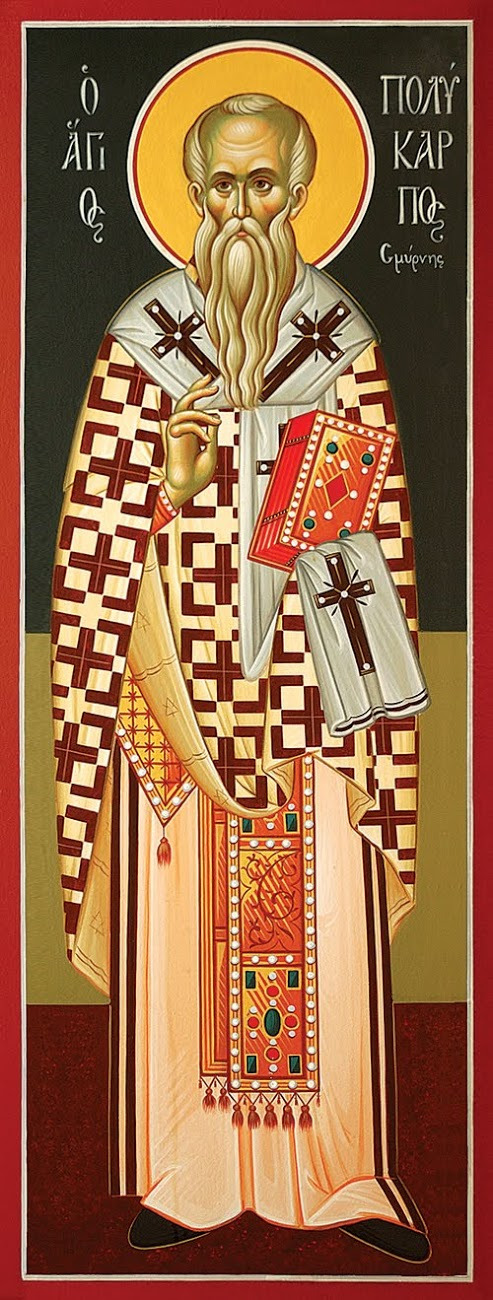
Saint Polycarp, Bishop of Smyrna, who was “fruitful in every good work” (Col. 1:10), was born in the first century, and lived in Smyrna in Asia Minor. He was orphaned at an early age, but at the direction of an angel, he was raised by the pious widow Kallista. After the death of his adoptive mother, Polycarp gave away his possessions and began to lead a chaste life, caring for the sick and the infirm. He was very fond of and close to Saint Bucolus, Bishop of Smyrna (February 6). He ordained Polycarp as deacon, entrusting to him to preach the Word of God in church. He also ordained him to the holy priesthood.
The holy Apostle John the Theologian was still alive at this time. Saint Polycarp was especially close to Saint John, and sometimes accompanied him on his apostolic journeys.
Shortly before his death, Saint Bucolus expressed his wish that Polycarp be made Bishop of Smyrna. When Saint Polycarp was consecrated as a bishop, the Lord Jesus Christ appeared to him. Saint Polycarp guided his flock with apostolic zeal, and he was also greatly loved by the clergy. Saint Ignatius the God-Bearer of Antioch (December 20) also had a high regard for him. Setting out for Rome where execution awaited him, he wrote to Saint Polycarp, “This age is in need of you if it is to reach God, just as pilots need winds, and as a storm-tossed sailor needs a port.”
The emperor Marcus Aurelius (161-180) came to the Roman throne and started up a most fierce persecution against Christians. The pagans demanded that the judge search for Saint Polycarp, “the father of all the Christians” and “the seducer of all Asia.”
During this time Saint Polycarp, at the persistent urging of his flock, stayed in a small village not far from Smyrna. When the soldiers came for him, he went out to them and invited them in to eat. He asked for time to pray, in order to prepare himself for martyrdom. His suffering and death are recorded in the “Epistle of the Christians of the Church of Smyrna to the Other Churches,” one of the most ancient memorials of Christian literature.
Having been brought to trial, Saint Polycarp firmly confessed his faith in Christ, and was condemned to be burned alive. The executioners wanted to nail him to a post, but he declared that God would give him the strength to endure the flames, so they could merely tie him with ropes. The flames encircled the saint but did not touch him, coming together over his head in the shape of a vault. Seeing that the fire did him no harm, the pagans stabbed him with a dagger. So much blood flowed from this wound that it extinguished the flames. The body of the hieromartyr Polycarp was then cremated. The Christians of Smyrna reverently gathered up what remained of his holy relics, and each year they celebrated the day of his martyrdom.
A story has been preserved about Saint Polycarp by his disciple, Saint Irenaeus of Lyons, which Eusebius cites in his ECCLESIASTICAL HISTORY (V, 20):
“I was still very young when I saw you in Asia Minor at Polycarp’s,” writes Saint Irenaeus to his friend Florinus, “but I would still be able to point out the place where Blessed Polycarp sat and conversed, and be able to depict his walk, his mannerisms in life, his outward appearance, his speaking to people, his companionable wandering with John, and how he himself related, together with other eyewitnesses of the Lord, those things that he remembered from the words of others. He also told what he heard from them about the Lord, His teachings and miracles....
“Through the mercy of God to me, I then already listened attentively to Polycarp and wrote down his words, not on tablets, but in the depths of my heart. Therefore, I am able to bear witness before God, that if this blessed and apostolic Elder heard something similar to your fallacy, he would immediately stop up his ears and express his indignation with his usual phrase: ‘Good God! That Thou hast permitted me to be alive at such a time!’”
During his life the holy bishop wrote several Epistles to the flock and letters to various individuals. The only one that has survived to the present day is his Epistle to the Philippians which, Saint Jerome testifies, was read in the churches of Asia Minor at divine services. It was written by the saint in response to the request of the Philippians to send them some letters of the hieromartyr Ignatius (December 20) which Saint Polycarp had in his possession.
The composer H.I.F. Bibier (1644-1704) has written a Sonata “Scti Polycarpi” for eight trumpets in honor of the holy martyr.
THE MONK ALEXANDER, FOUNDER OF THE "UNCEASING VIGILANCE" MONASTERY (430)

Saint Alexander, Founder of the Monastery of the “Unsleeping Ones,” was born in Asia and received his education at Constantinople. He spent some time in military service but, sensing a call to other service, he left the world and accepted monastic tonsure in one of the Syrian wilderness monasteries near Antioch, under the guidance of igumen Elias. He spent four years in strict obedience and monastic effort, after which he received from the igumen blessing to dwell in the desert. Going into the wilderness, the monk took with him nothing from the monastery, except the Gospel. The monk then struggled in the desert for seven years. Afterwards, the Lord summoned him to preach to pagans.
The saint converted to Christ the local city ruler named Rabul, who afterwards was consecrated a bishop and for 30 years occupied the bishop’s cathedra of the city of Edessa. Together with Rabul all the local inhabitants accepted Baptism, and before receiving the sacrament they burned their idols in the city square. Having confirmed the newly-converted in the Faith, Saint Alexander again went into the desert, where by chance he came upon a cave of robbers. Unafraid of the danger that threatened him, he preached the Gospel to them and urged them to repent. In fact, all the robbers did repent. They accepted holy Baptism, and they transformed their cave into a monastery, where they dwelt in prayer and penitence. Saint Alexander appointed an igumen for them, gave them a monastic rule, and he himself resettled still farther in the desert.
For several years he lived in complete solitude. But even there lovers of solitude began to flock to the monk. A monastery emerged, numbering 400 monks. Desiring at this monastery to establish uninterrupted praise to the Lord, the monk prayed for three years, that the Creator would reveal to him His will, and having then received the revelation, he initiated at the monastery the following order: all the monks were divided into 24 watches of prayer. Changing shifts each hour, day and night they sang in two choirs the Psalms of David, interrupting this only for the times of the divine services. The monastery received the name “ the Unsleeping Ones,” because the monks sang praise to God throughout the day and night.
Saint Alexander guided the monastery on the Euphrates for twelve years. Afterwards, leaving one of his disciples, the experienced Elder Trophimus as its igumen, he set out with some chosen brethren through the cities bordering on Persia, preaching the Gospel among the pagans. After this missionary journeying, Saint Alexander lived with his monks for a certain while at Antioch. There he built a church for the city-dwellers, and a home for the sick and homeless with the money that charitable Antiochians put at his disposal. However, through the intrigues of the jealous, Saint Alexander was compelled to move to Constantinople.
Here he founded a new monastery, in which he also initiated a monastic rule of “unceasing vigilance.” Saint Alexander and his monks suffered at Constantinople under the Nestorian heretics, enduring beatings and imprisonment. After this, when the storm of unrest abated, Saint Alexander spent the last days of his life at the Constantinople monastery he founded. He died in extreme old age in about the year 430, after 50 years of incessant monastic effort. He is also commemorated on February 23.
Source: Orthodox Church in America_OCA


1 JOHN 4:20-5:21
20 If someone says, "I love God," and hates his brother, he is a liar; for he who does not love his brother whom he has seen, how can he love God whom he has not seen? 21 And this commandment we have from Him: that he who loves God must love his brother also.
1 Whoever believes that Jesus is the Christ is born of God, and everyone who loves Him who begot also loves him who is begotten of Him. 2 By this we know that we love the children of God, when we love God and keep His commandments. 3 For this is the love of God, that we keep His commandments. And His commandments are not burdensome. 4 For whatever is born of God overcomes the world. And this is the victory that has overcome the world-our faith. 5 Who is he who overcomes the world, but he who believes that Jesus is the Son of God? 6 This is He who came by water and blood-Jesus Christ; not only by water, but by water and blood. And it is the Spirit who bears witness, because the Spirit is truth. 7 For there are three that bear witness in heaven: the Father, the Word, and the Holy Spirit; and these three are one. 8 And there are three that bear witness on earth: the Spirit, the water, and the blood; and these three agree as one. 9 If we receive the witness of men, the witness of God is greater; for this is the witness of God which He has testified of His Son. 10 He who believes in the Son of God has the witness in himself; he who does not believe God has made Him a liar, because he has not believed the testimony that God has given of His Son. 11 And this is the testimony: that God has given us eternal life, and this life is in His Son. 12 He who has the Son has life; he who does not have the Son of God does not have life. 13 These things I have written to you who believe in the name of the Son of God, that you may know that you have eternal life, and that you may continue to believe in the name of the Son of God. 14 Now this is the confidence that we have in Him, that if we ask anything according to His will, He hears us. 15 And if we know that He hears us, whatever we ask, we know that we have the petitions that we have asked of Him. 16 If anyone sees his brother sinning a sin which does not lead to death, he will ask, and He will give him life for those who commit sin not leading to death. There is sin leading to death. I do not say that he should pray about that. 17 All unrighteousness is sin, and there is sin not leading to death. 18 We know that whoever is born of God does not sin; but he who has been born of God keeps himself, and the wicked one does not touch him. 19 We know that we are of God, and the whole world lies under the sway of the wicked one. 20 And we know that the Son of God has come and has given us an understanding, that we may know Him who is true; and we are in Him who is true, in His Son Jesus Christ. This is the true God and eternal life. 21 Little children, keep yourselves from idols. Amen.
MARK 15:1-15
1 Immediately, in the morning, the chief priests held a consultation with the elders and scribes and the whole council; and they bound Jesus, led Him away, and delivered Him to Pilate. 2 Then Pilate asked Him, "Are You the King of the Jews?" He answered and said to him, "It is as you say." 3 And the chief priests accused Him of many things, but He answered nothing. 4 Then Pilate asked Him again, saying, "Do You answer nothing? See how many things they testify against You!" 5 But Jesus still answered nothing, so that Pilate marveled. 6 Now at the feast he was accustomed to releasing one prisoner to them, whomever they requested. 7 And there was one named Barabbas, who was chained with his fellow rebels; they had committed murder in the rebellion. 8 Then the multitude, crying aloud, began to ask him to do just as he had always done for them. 9 But Pilate answered them, saying, "Do you want me to release to you the King of the Jews?" 10 For he knew that the chief priests had handed Him over because of envy. 11 But the chief priests stirred up the crowd, so that he should rather release Barabbas to them. 12
Pilate answered and said to them again, "What then do you want me to do with Him whom you call the King of the Jews?" 13 So they cried out again, "Crucify Him!" 14 Then Pilate said to them, "Why, what evil has He done?" But they cried out all the more, "Crucify Him!" 15 So Pilate, wanting to gratify the crowd, released Barabbas to them; and he delivered Jesus, after he had scourged Him, to be crucified.
#orthodoxy#orthodoxchristianity#easternorthodoxchurch#originofchristianity#spirituality#holyscriptures#gospel#wisdom#bible#saints
2 notes
·
View notes
Text
Feast of Saint Polycarp today so you should read this:
10 notes
·
View notes
Photo
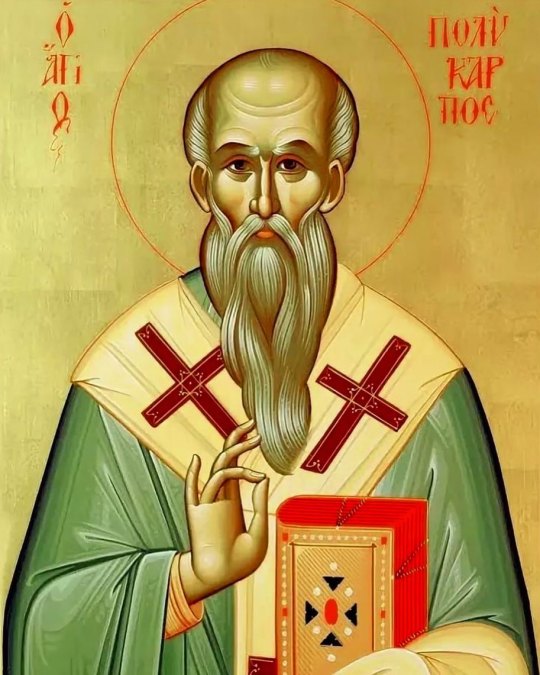
Today we celebrate our Venerable Father Polycarp of Smyrna. Born in Ephesus around 70 AD, St Polycarp was raised by a devout Christian noblewoman, Callista, who received Polycarp in her care when his parents were martyred. Polycarp was, from a young age, generous in spirit and thirsty to serve those around him in Christ’s name. He became the disciple of St John the Theologian alongside Saints Bucolos and Ignatius. Together they preached the Word until Bucolos was appointed bishop of Smyrna, with Polycarp as his assistant and later, his successor. Polycarp performed many miracles during this time: a huge fire was extinguished and a famine was broken with his prayers. This converted many pagans in the Church of Smyrna. In 154, Polycarp, now a well-seasoned bishop of over fifty years, travelled to Rome to address Pope Anacletus in the wake of a controversy concerning the date of Easter. Polycarp corrected those who had been following the heresies of Valentinus and Marcion. When Polycarp returned to Smyrna, the churches of Asia came under the attack of Proconsul Stratius Quadratus. Polycarp was captured and thrown into the stadium in front of the Proconsul and a crowd of shouting pagans who demanded he be set on fire. After refusing to deny Christ, Polycarp calmly undressed, and when the soldiers began to nail him to the stake, Polycarp said to them, “Let me be. For he who gives me the strength to endure the flames will also help me to remain steadfast at the stake”. The wood around him was lit, but the flame did not touch Polycarp, instead forming a wall around him. Because of this, the executioner was instructed to stab him. Polycarp bled so much that the fire was put out, and he gained the incorruptible crown of martyrdom. May he intercede for us always + Source: https://lychnos.org/saints-and-feasts/feb23-saint-polycarp-the-hieromartyr/ (at Kocaeli İzmit) https://www.instagram.com/p/Co-dGFJridZ/?igshid=NGJjMDIxMWI=
8 notes
·
View notes
Text
The martyrdom of Polycarp is a story of heroic faith in the presence of deadly opposition. Today, listen as R.C. Sproul recounts the ancient tale of this man who bore witness to Christ and served Him faithfully to the very end.
3 notes
·
View notes
Text
Today the Church remembers St. Polycarp, Bishop and Martyr of Smyrna.
Ora pro nobis.
Polycarp (AD 69 – 155) was a 2nd-century AD Christian bishop of Smyrna. According to the Martyrdom of Polycarp he died a martyr, bound and burned at the stake, then stabbed when the fire refused to touch him. Polycarp is regarded as a saint and Church Father in the Eastern Orthodox, Oriental Orthodox, Catholic, Anglican, and Lutheran churches.
It is recorded by St. Irenaeus, who heard him speak in his youth, and by Tertullian, that he had been a disciple of St. John the Apostle. St. Jerome wrote that Polycarp was a disciple of John and that John had ordained him bishop of Smyrna.
Polycarp is recorded as saying on the day of his death, "Eighty and six years I have served Him, and He has done me no wrong", which could indicate that he was then eighty-six years old or that he may have lived eighty-six years after his conversion. Polycarp goes on to say "How then can I blaspheme my King and Savior? You threaten me with a fire that burns for a season, and after a little while is quenched; but you are ignorant of the fire of everlasting punishment that is prepared for the wicked."
Polycarp was bound to a stake to be burned to death, but eyewitness, including his murderers, recount that the flames billowed out like a sail and refused to touch him. The soldiers were then ordered to end his life by piercing him through with a spear. His crime was refusing to burn incense to the Roman Emperor. On his farewell, he said "I bless you Father for judging me worthy of this hour, so that in the company of the martyrs I may share the cup of Christ."
With Clement of Rome and Ignatius of Antioch, Polycarp is regarded as one of three chief Apostolic Fathers, that is, those who were disciples of one of Jesus’ 12 Apostles, and so provided a living link to the eyewitnesses of Jesus.
O God, the maker of heaven and earth, you gave your venerable servant, the holy and gentle Polycarp, boldness to confess Jesus Christ as King and Savior, and steadfastness to die for his faith: Give us grace, following his example, to share the cup of Christ and rise to eternal life; through Jesus Christ our Lord, who lives and reigns with you and the Holy Spirit, one God, now and forever.
Amen.
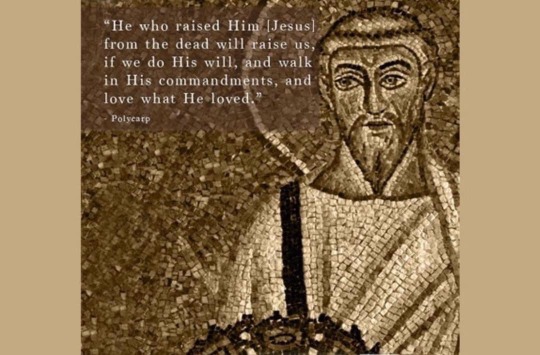
#father troy beecham#christianity#jesus#saints#god#salvation#peace#martyrs#faith#early church#apostolic father
3 notes
·
View notes
Quote
When persecution broke out in Smyrna, some Christians were rounded up for interrogation, and required to renounce Christ and bow before the Roman emperor as a condition of release. When they refused, they were tortured and executed. Eyewitness accounts from this time highlight the public brutality of the persecution. Believers were lashed until their muscles were laid bare, forced to lie down on shards of shells, and thrown into arenas to be devoured by wild animals in front of the townspeople. There are striking examples of early martyrs welcoming these sufferings in the name of Christ. One Germanicus even embraced the wild beast and pulled it toward himself to meet death as quickly as possible.
Plough [dotcom] via Bearing Witness: Stories of Martyrdom and Costly Discipleship. Resources: “The Martyrdom of Polycarp” in The Ante-Nicene Fathers, edited by Philip Schaff, et al., translated by Marcus Dods (Peabody, MA: Hendrickson Publishers, 1996) is the most complete account. History of the Church in Nicene and Post-Nicene Fathers, Series 2: Eusebius, edited by Philip Schaff, et al. (Grand Rapids, MI: Wm. B. Eerdmans, 1984) includes valuable commentary by Eusebius. Finally, Irenaeus, Against Heresies, translated by Philip Schaff; edited by Alexander Roberts, et al. (Grand Rapids, MI: Wm. B. Eerdmans, 2001) contains details on Polycarp’s earlier life and character.
3 notes
·
View notes
Text
Wielding death
When everyday life is marked by oppression and violence, can a martyr’s death truly be an act of freedom and resistance?
Human rights and justice 24 February 2023
"Through death, the monk becomes a martyr, and Saint Polycarp’s story begins to spread Christianity further across the Roman Empire. But his martyrdom represents more than the spread of a single oppressed religion: Polycarp’s sacrifice in the 2nd century CE shows what it can mean to wield death as a form of resistance. A form that will shape the ambit of political action in the millennia that follow.
The history of Christianity is filled with martyrs like Polycarp, but martyrdom is not an invention of Christianity. In the settled societies of the Mediterranean basin, martyrs challenged repressive political power."
"When everyday life is pervasively animated by oppressive forms of enforced death, can death itself be appropriated and turned into an act of resistance and freedom?
When is such expression appropriate? For Frantz Fanon, the great philosopher and anticolonial militant, death is a preferable form of political expression when people are oppressed by conditions that appear to stretch across time – an all-encompassing ‘web of three-dimensional violence’. Ending what appears to be a territorially endless and temporally eternal regime, by any means necessary, may include death."
2 notes
·
View notes
Text
St. Polycarp the Holy Martyr & Bishop of Smyrna
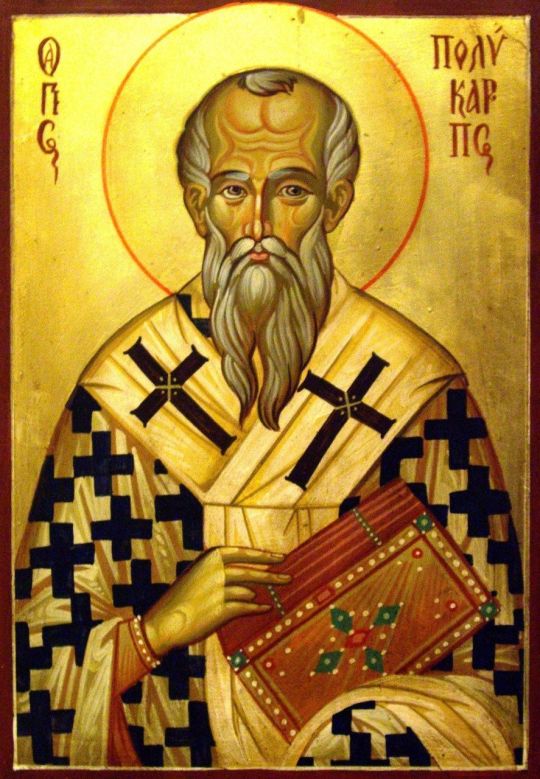
Christ is Risen! Truly He is Risen!
Today we are going to be continuing our look into the Church Fathers, specifically St. Polycarp the Holy Martyr & Bishop of Smyrna. Like St. Clement, I first heard about St. Polycarp from my friend when he was talking about the Church Fathers with my Protestant friends. I’m excited to look into this Saint’s life and learn more about him!
~~~~~~~~~~~~~~~~~~~~~~~~~~~~~~~~~~~~
St. Polycarp (Feast Day February 23rd) was born in the 1st century and lived in Smyrna, which is in Asia Minor. He was orphaned at an early age, but was raised by a pious widow named Kallista. After her death, the martyr gave away his possessions and began to lead a chaste life. He cared for the sick and the infirm. The saint was very close to St. Bucolus, who was the Bishop of Smyrna. The Bishop ordained St. Polycarp as deacon and eventually into the holy priesthood.
At the time, the holy Apostle John the Theologian was still alive. St. Polycarp was close to St. John and would sometimes accompany him on his apostolic journeys.
Before he died, St. Bucolus’ wish was that St. Polycarp would become the Bishop of Smyrna. When St. Polycarp was consecrated as a bishop, the Lord Jesus Christ appeared to him. The saint guided the church with apostolic zeal and was greatly loved by the clergy. Even St. Ignatius the God-Bearer of Antioch, another Church Father, had a high regard for him. When St. Ignatius was headed to Rome for his execution, he wrote to St. Polycarp, saying, “This age is in need of you if it is to reach God, just as pilots need winds, and as a storm-tossed sailor needs a port” (Hieromartyr Polycarp, Bishop of Smyrna).
In the year 161, the Roman emperor Marcus Aurelius came to throne and began to persecute heavily against Christians. The emperor demanded that the judge search for St. Polycarp, who he considered “the father of all the Christians” and “the seducer of all Asia” (Hieromartyr Polycarp, Bishop of Smyrna).
At this time, St. Polycarp was staying in a small village not far from Smyrna. When the soldiers came for him, he went out to them and invited them in to eat. He then asked the soldiers for time to pray, so that he could prepare himself for martyrdom.
When he was brought to trial, St. Polycarp firmly confessed his faith in Christ. He was condemned to be burned alive. The executioners wanted to nail the saint to his post, but St. Polycarp told them that God would give him the strength to endure the flames. So, he told them that they could just tie him with ropes. When the burning started, the flames encircled the saint but did not touch him. Instead, they came together over his head in the shape of a vault. Seeing that the fire wasn’t harming him, the pagans instead stabbed him with a dagger. “So much blood flowed from this wound that it extinguished the flames” (Hieromartyr Polycarp, Bishop of Smyrna). The martyr’s body was then cremated.
~~~~~~~~~~~~~~~~~~~~~~~~~~~~~~~~~~~~
Throughout his lifetime, St. Polycarp wrote several Epistles to his flock as well as letters to various individuals. The only one that has survived to present day is his Epistle to the Philippians. St. Jerome testifies that this epistle was read in the churches of Asia Minor at divine services and was written in response to the Philippians’ request to send them some letters of St. Ignatius, which St. Polycarp had.
~~~~~~~~~~~~~~~~~~~~~~~~~~~~~~~~~~~~
I really liked reading St. Polycarp’s story. I think it’s interesting that he was extremely close with St. John the Theologian and that he even accompanied him on his apostolic journeys. What a glorious experience that must have been!
One of the things that also stood out to me with St. Polycarp was how he acted towards his persecutors. Instead of fighting with the soldiers who came to take him away, he invited them in to eat. He also asked them for time to pray, which they granted. And St. Polycarp prayed to God, knowing that death was near. Despite knowing there was no way he’d get out of this situation alive, he still trusted God. I know I struggle with praying and keeping up with prayer, especially during times of distress. So, I admire that this saint was able to do it during such a sad time and face it happily.
It’s also really cool seeing that St. Ignatius held St. Polycarp in such a high regard. A fellow Church Father told St. Polycarp that he was important for the age to reach God. That’s such a high compliment and was definitely true.
Like St. Clement’s writings, I should definitely look into St. Polycarp’s Epistle to the Philippians. Hopefully there will be a good English translation online where I could read it.
May God bless you all and until next time!
- Joanna
~~~~~~~~~~~~~~~~~~~~~~~~~~~~~~~~~~~~
Sources:
“Hieromartyr Polycarp, Bishop of Smyrna.” Orthodox Church in America, https://www.oca.org/saints/lives/2012/02/23/100589-hieromartyr-polycarp-bishop-of-smyrna.
2 notes
·
View notes
Text
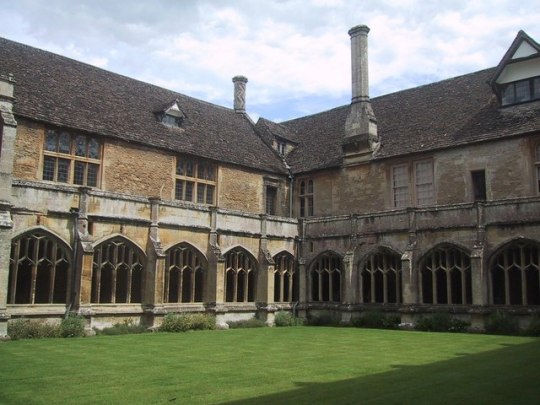
SAINTS OF THE DAY FOR APRIL 17
ST. SIMEON, BISHOP OF SELEUCIA AND MARTYR-In 324, Simeon Barsabae became Bishop of Seleucia-Ctesiphon in Persia. Twenty years later, the king, Sapor II began once again to persecute Christians, and Simeon was martyred with numerous companions, including Usthazade, a eunuch in the royal court, whom he converted on his way to martyrdom.
St. Anicetus, Roman Catholic Pope a Syrian from Emesa. He became pope about 155 and actively opposed Marcionism and Gnosticism. His pontificate saw the appearance of the controversy between East and West over the date of Easter. St. Polycarp, a disciple of John, is reported to have visited him in Rome about the dispute, which was to accelerate and grow more heated over the following centuries. Feast day April 17
ST. ROBERT, ABBOT OF CÌTEAUX-A monk at Molesme, in France, Robert pressed for a strict observance of the Benedictine rule, in contrast to his brethren. In 1098 he founded at new abbey at Cîteaux, whose monks were later called Cistercians. He died in 1111, and was canonized by Pope Honorius III in 1222.
St. Stephen Harding, O.Cist. Roman Catholic English monk and abbot, who was one of the founders of the Cistercian Order. Feast day April 17
1 note
·
View note
Text

Saint Zoe of Rome
Died: 286
Feast Day: July 5
Saint Zoe of Rome was a noblewoman married to a Roman official/jailer during the reign of Diocletian. She had been mute for 6 years and was healed, then baptized by St. Sebastian. Her healing helped convert her family and the prisoners that her husband was in charge of, who were then baptized by St. Polycarp. While praying at the tomb of St. Peter the Apostle, Zoe was arrested then martyred. St. Zoe appeared to St. Sebastian before his martyrdom in 288.
Prints, plaques & holy cards available for purchase here: (website)
75 notes
·
View notes
Text
SAINT OF THE DAY (June 28)
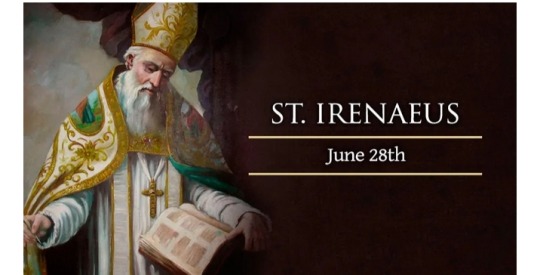
Celebrated by the Roman Catholic Church on June 28, and by Eastern Catholics of the Byzantine tradition on August 23, Saint Irenaeus of Lyons was a second-century bishop and writer in present-day France.
He is best known for defending Christian orthodoxy, especially the reality of Christ’s human incarnation against the set of heresies known as Gnosticism.
Pope Benedict XVI spoke admiringly of St. Irenaeus in a 2007 general audience, recalling how this early Church Father “refuted the Gnostic dualism and pessimism, which debased corporeal realities.
He decisively claimed the original holiness of matter, of the body, of the flesh no less than of the spirit.
But his work went far beyond the confutation of heresy: in fact, one can say that he emerges as the first great Church theologian who created systematic theology; he himself speaks of the system of theology, that is, of the internal coherence of all faith.”
While some of St. Irenaeus’ most important writings have survived, the details of his life are not as well-preserved.
He was born in the Eastern half of the Roman Empire, likely in the Aegean coastal city of Smyrna, probably around the year 140.
As a young man, he heard the preaching of the early bishop (and eventual martyr) Saint Polycarp, who had been personally instructed by the Apostle John.
Irenaeus eventually became a priest and served in the Church of Lyons (in the region of Gaul) during a difficult period in the late 170s.
During this time of state persecution and doctrinal controversy, Irenaeus was sent to Rome to provide Pope St. Eleutherius with a letter about the heretical movement known as Montanism.
After returning to Lyons, Irenaeus became the city’s second bishop, following the martyrdom of his predecessor Saint Pothinus.
In the course of his work as a pastor and evangelist, the second Bishop of Lyon came up against various heretical doctrines and movements, many of which sounded a common note in their insistence that the material world was evil and not part of God’s original plan.
The proponents of these ideas often claimed to be more deeply “enlightened” or “spiritual” than ordinary Christians, on account of their supposed secret knowledge (or “gnosis”).
Irenaeus recognized this movement, in all its forms, as a direct attack on the Catholic faith.
The Gnostics’ disdain for the physical world was irreconcilable with the Biblical doctrine of creation, which stated that God had made all things according to his good purpose.
Gnostics, by contrast, saw the material world as the work of an evil power, crediting God only with the creation of a higher and purely spiritual realm.
In keeping with its false view of creation, Gnosticism also distorted the concept of redemption.
The Church knew Christ as the savior of the world: redeeming believers’ bodies and souls, and investing creation with a sacramental holiness.
Gnostics, meanwhile, saw Jesus merely as saving souls from the physical world in which they were trapped.
Gnostic “redemption” was not liberation from sin but a supposed promise of release from the material world.
Irenaeus refuted the Gnostic errors in his lengthy book “Against Heresies,” which is still studied today for its historical value and theological insights.
A shorter work, the “Proof of the Apostolic Preaching,” contains Irenaeus’ presentation of the Gospel message, with a focus on Jesus Christ’s fulfillment of Old Testament prophecies.
Several of his other works are now lost, though a collection of fragments from them has been compiled and translated.
St. Irenaeus’ earthly life ended around 202 – possibly through martyrdom, though this is not definitively known.
6 notes
·
View notes
Text
Saints&Reading: Wednesday, March 8, 2023
march 8_february 23
SAINT POLYCARP, BISHOP OF SMYRNA (167)

Saint Polycarp, Bishop of Smyrna, who was “fruitful in every good work” (Col. 1:10), was born in the first century, and lived in Smyrna in Asia Minor. He was orphaned at an early age, but at the direction of an angel, he was raised by the pious widow Kallista. After the death of his adoptive mother, Polycarp gave away his possessions and began to lead a chaste life, caring for the sick and the infirm. He was very fond of and close to Saint Bucolus, Bishop of Smyrna (February 6). He ordained Polycarp as deacon, entrusting to him to preach the Word of God in the church. Furthermore, he also ordained him to the holy priesthood.
The holy Apostle John the Theologian was still alive at this time. Saint Polycarp was especially close to Saint John, and sometimes accompanied him on his apostolic journeys.
Shortly before his death, Saint Bucolus expressed his wish that Polycarp be made Bishop of Smyrna. When Saint Polycarp was consecrated as a bishop, the Lord Jesus Christ appeared to him. Saint Polycarp guided his flock with apostolic zeal, and he was also greatly loved by the clergy. Saint Ignatius the God-Bearer of Antioch (December 20) also had a high regard for him. Setting out for Rome where execution awaited him, he wrote to Saint Polycarp, “This age is in need of you if it is to reach God, just as pilots need winds, and as a storm-tossed sailor needs a port.”
The emperor Marcus Aurelius (161-180) came to the Roman throne and started up a most fierce persecution against Christians. The pagans demanded that the judge search for Saint Polycarp, “the father of all the Christians” and “the seducer of all Asia.”
During this time Saint Polycarp, at the persistent urging of his flock, stayed in a small village not far from Smyrna. When the soldiers came for him, he went out to them and invited them in to eat. He asked for time to pray, in order to prepare himself for martyrdom. His suffering and death are recorded in the “Epistle of the Christians of the Church of Smyrna to the Other Churches,” one of the most ancient memorials of Christian literature.
Having been brought to trial, Saint Polycarp firmly confessed his faith in Christ, and was condemned to be burned alive. The executioners wanted to nail him to a post, but he declared that God would give him the strength to endure the flames, so they could merely tie him with ropes. The flames encircled the saint but did not touch him, coming together over his head in the shape of a vault. Seeing that the fire did him no harm, the pagans stabbed him with a dagger. So much blood flowed from this wound that it extinguished the flames. The body of the hieromartyr Polycarp was then cremated. The Christians of Smyrna reverently gathered up what remained of his holy relics, and each year they celebrated the day of his martyrdom.
A story has been preserved about Saint Polycarp by his disciple, Saint Irenaeus of Lyons, which Eusebius cites in his ECCLESIASTICAL HISTORY (V, 20):
“I was still very young when I saw you in Asia Minor at Polycarp’s,” writes Saint Irenaeus to his friend Florinus, “but I would still be able to point out the place where Blessed Polycarp sat and conversed, and be able to depict his walk, his mannerisms in life, his outward appearance, his speaking to people, his companionable wandering with John, and how he himself related, together with other eyewitnesses of the Lord, those things that he remembered from the words of others. He also told what he heard from them about the Lord, His teachings and miracles....
“Through the mercy of God to me, I then already listened attentively to Polycarp and wrote down his words, not on tablets, but in the depths of my heart. Therefore, I am able to bear witness before God, that if this blessed and apostolic Elder heard something similar to your fallacy, he would immediately stop up his ears and express his indignation with his usual phrase: ‘Good God! That Thou hast permitted me to be alive at such a time!’”
During his life the holy bishop wrote several Epistles to the flock and letters to various individuals. The only one that has survived to the present day is his Epistle to the Philippians which, Saint Jerome testifies, was read in the churches of Asia Minor at divine services. It was written by the saint in response to the request of the Philippians to send them some letters of the hieromartyr Ignatius (December 20) which Saint Polycarp had in his possession.
The composer H.I.F. Bibier (1644-1704) has written a Sonata “Scti Polycarpi” for eight trumpets in honor of the holy martyr.
SAINT GORGONIA, SISTER OF SAINTED GREGORY THE THEOLOGIAN (372)
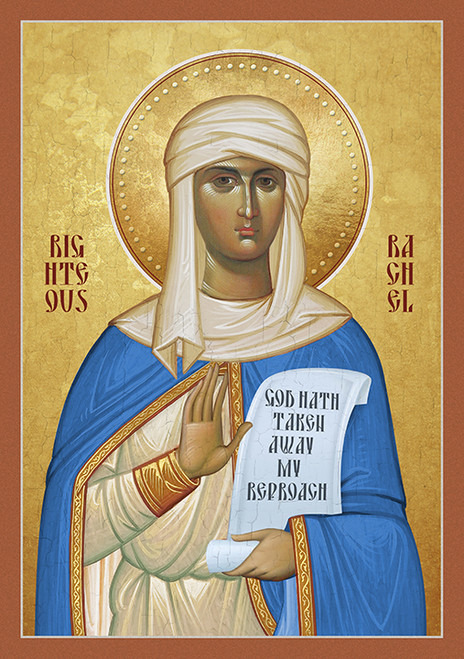
Most of the information about Saint Gorgonia (Γοργονία) comes from her brother, Saint Gregory Nazianzus (January 25) in his Oration VIII, "On his Sister Gorgonia," which was delivered sometime after their brother Saint Caesarius (March 9) went to the Lord in 369, and before the repose of their father, the elder Saint Gregory Nazianzus, in 374.
She was the daughter of Saint Gregory Nazianzus (January 1) and Saint Nonna (August 5), and was named for her maternal grandmother Gorgonia. Saint Gregory the Theologian tells us that she derived her existence and her reputation from their parents, because they sowed in her the seeds of piety.
In praising her virtues, Saint Gregory states that her modesty surpassed those of her own time, and those who lived before her. She blended the excellence of the married state with that of the unmarried state, avoiding the disadvantages of each, while combining all that is best in both. Thus, Saint Gorgonia proved that "neither of them absolutely binds us to, or separates us from, God or the world." It is the mind which nobly presides over marriage and virginity, arranging and working on them as "the raw material of virtue."
Saint Gorgonia had consecrated herself to God, and also won her husband Alypios to her side. He was from the city of Iconium, where Faustinus was the bishop. She made Alypios "a good fellow servant, instead of an unreasonable master." This pious couple had five children; two sons who became bishops, and three daughters: Alypianḗ, Eugenia, and Nonna. Moreover, she made her children and their children's children the fruit of her spirit, dedicating to God not only her soul, but also her entire family and household. As long as she lived, she showed herself as an example of all that is good. Her devoted brother even compared her to King Solomon's virtuous woman (Proverbs 31:10-31).
This daughter of a saintly family took both her natural and spiritual parents as her models of virtue, and they were the source of her goodness. She did not wear fine clothes or expensive jewelry, nor did she use pigments to enhance her beauty. The only red coloring dear to her was the blush of modesty; and her only white coloring was the tint of temperance.
She adorned the churches with offerings, and thereby presented herself to God as a living temple. She opened her house to members of her family who were in want, and even to strangers. She was sympathetic to those in trouble, and compassionate toward widows. She "dispersed abroad" and "gave to the poor" (Psalm 111/112:9). The only wealth she left to her children was the excellence of her example.
In her fasting, her chanting of the Psalms, her vigils, her tears, and her prayers, she surpassed not only women, but also the most devout men, thereby demonstrating that the distinction between male and female is one of body, not of soul.
One day, as Saint Gorgonia was riding in her carriage, the mules bolted and the carriage was overturned. She was dragged over the ground and suffered serious injury. Those who were not Christians were scandalized that God would permit such a thing to happen to this righteous woman. Although she was bruised in her bones and limbs, she would not allow a physician to examine her, in order to preserve her modesty. She trusted that God would heal her, and He did. Seeing her unexpected recovery, people concluded that the accident had occurred so that by her patient endurance and her miraculous healing, God would be glorified.
Saint Gorgonia longed for death, preferring to be with Christ rather than remain on earth. She had a vision in which the day of her death was revealed to her so that she might prepare herself. As that time drew near she took to her bed, and spent her last day giving instructions to her husband, her children, and her friends. After discoursing about spiritual matters, she reposed in the year 370 at the age of thirty-eight. Her last words were, “I will both lie down in peace and sleep” (Psalm 4:8).
Source of all texts: Orthodox Church in America_OCA


ISAIAH 5:16-25
16 But the Lord of hosts shall be exalted in judgment, And God who is holy shall be hallowed in righteousness. 17 Then the lambs shall feed in their pasture, And in the waste places of the fat ones strangers shall eat. 18 Woe to those who draw iniquity with cords of vanity, And sin as if with a cart rope; 19 That say, “Let Him make speed and hasten His work, That we may see it; And let the counsel of the Holy One of Israel draw near and come, That we may know it.” 20 Woe to those who call evil good, and good evil; Who put darkness for light, and light for darkness; Who put bitter for sweet, and sweet for bitter! 21 Woe to those who are wise in their own eyes, And prudent in their own sight! 22 Woe to men mighty at drinking wine, Woe to men valiant for mixing intoxicating drink, 23 Who justify the wicked for a bribe, And take away justice from the righteous man! 24 Therefore, as the fire devours the stubble, And the flame consumes the chaff, So their root will be as rottenness, And their blossom will ascend like dust; Because they have rejected the law of the Lord of hosts, And despised the word of the Holy One of Israel. 25 Therefore the anger of the Lord is aroused against His people; He has stretched out His hand against them And stricken them, And the hills trembled. Their carcasses were as refuse in the midst of the streets. For all this His anger is not turned away, But His hand is stretched out still.
PROVERBS 5:15-6:4
15 Drink water from your own cistern, And running water from your own well. 16 Should your fountains be dispersed abroad, Streams of water in the streets? 17 Let them be only your own, And not for strangers with you. 18 Let your fountain be blessed, And rejoice with the wife of your youth. 19 As a loving deer and a graceful doe, Let her breasts satisfy you at all times; And always be enraptured with her love. 20 For why should you, my son, be enraptured by an immoral woman, And be embraced in the arms of a seductress? 21 For the ways of man are before the eyes of the Lord, And He ponders all his paths. 22 His own iniquities entrap the wicked man, And he is caught in the cords of his sin. 23 He shall die for lack of instruction, And in the greatness of his folly he shall go astray.
Commentary from the Church’s Fathers
Basil the Great AD 379: “Drink water out of your own cistern,” that is, examine your own resources, do not go to the springs belonging to others, but from your own streams gather for yourself the consolations of life. Do you have metal plates, clothing, beasts of burden, utensils of every kind? Sell them; permit all things to go except your [soul’s] liberty. Homilies on the Psalms (Psalm ).
John Cassian AD 435: “Drink the waters from your own wells, fresh water from your own source.” … As the prophet Isaiah declares, “You will be like a wellwatered garden, like a flowing spring whose waters will never fail. And places emptied for ages will be built up in you. You will lift up the foundations laid by generation after generation. You will be called the builder of fences, the one who turns the pathways toward peace.” … And so it will happen that not only the whole thrust and thought of your heart but even all the wanderings and the straying of your thoughts will turn into a holy and unending meditation on the law of God.
Augustine of Hippo AD 430:“Let the fountain of your water be your own and let no stranger share with you.” For all who do not love God are strangers, are antichrists. And although they enter the basilicas, they cannot be numbered among the sons of God. That fountain of life does not belong to them. Even an evil person can have baptism; even an evil person can have prophecy. We find that king Saul had prophecy; he was persecuting the holy David and was filled with the Spirit of prophecy and began to prophesy. Even an evil person can receive the sacrament of the body and blood of the Lord, for about such it has been said, “He who eats and drinks unworthily eats and drinks judgment to himself.” Even an evil person can have the name of Christ, that is, even an evil person can be called Christian; and about these it has been said, “They profaned the name of their God.” Therefore, even an evil man can have all these mysteries. But he cannot have love and be evil. This, then, is the peculiar gift; it is the unique fountain. For drinking of this the Spirit of God encourages you; for drinking of himself the Spirit of God encourages you.
1 My son, if you become surety for your friend, If you have shaken hands in pledge for a stranger, 2 You are snared by the words of your mouth; You are taken by the words of your mouth. 3 So do this, my son, and deliver yourself; For you have come into the hand of your friend: Go and humble yourself; Plead with your friend. 4 Give no sleep to your eyes, Nor slumber to your eyelids.
Gregory The Dialogis tAD 604: Whoever is responsible for others for an example of living is admonished to be watchful not only over himself but also to arouse his friend. Indeed, it is not sufficient for him to keep watch by a good life, if he does not remove from the torpor of sin the person over whom he is set, for it is well said: “Give not sleep to your eyes, neither let your eyelids slumber.” To give sleep to the eyes is to cease from care and thus to neglect altogether the charge of subjects. The eyelids slumber when our thoughts, weighed down by sloth, connive at what we know should be reproved. To be in deep sleep is neither to know, nor to correct, the actions of those committed to us. To slumber but not to sleep is to be well aware of what should be reprehended but not to amend it with proper reproof, owing to mental sloth. Yet by slumbering, the eye is induced to sleep profoundly, because commonly the superior who does not eradicate the evil which he observes, comes to that state which his negligence deserves, namely, not even to recognize the sins of his subjects. Therefore, those who [care for others’ souls] must be warned to be earnestly on the watch, to have vigilant eyes within and round about, and to strive to become living creatures of heaven. .
#orthodoxy#orthodoxchristianity#easternorthodoxchurch#originofchristianity#spirituality#holyscriptures#bible#oldtestament#wisdom
2 notes
·
View notes